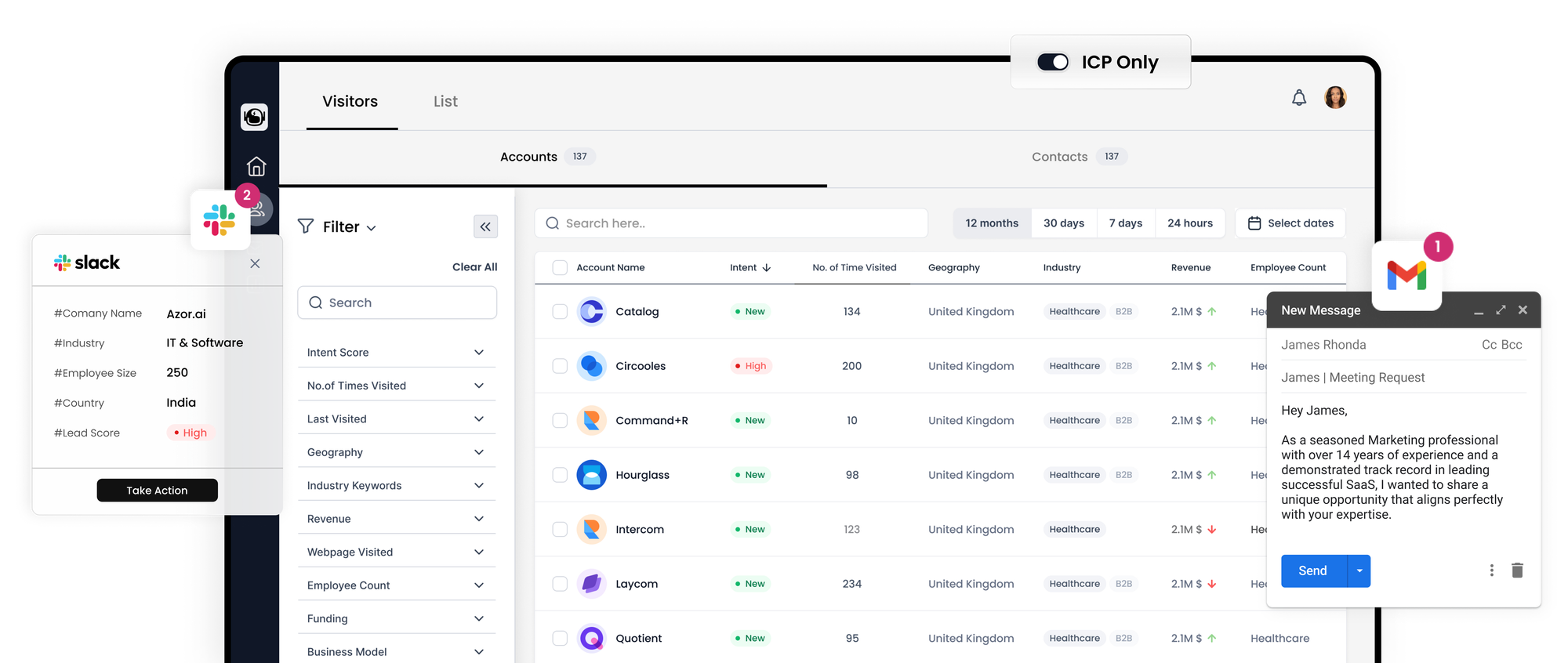Exploring the Best B2B Marketing Strategies and Real-World Examples

Marketing your products or services to businesses (B2B) can be a challenging endeavor. While you might be familiar with consumer marketing (B2C) as an individual, selling to businesses involves distinct processes and strategies. In this guide, we'll delve into the world of B2B marketing, its importance, and different strategies, accompanied by real-world examples.
Understanding B2B Marketing:
B2B marketing encompasses the process of one business promoting its products or services to another business. This form of marketing is essential when one company's offerings are integral to another's operations or improvement.

Examples of B2B marketing scenarios include:
1. An industrial pump manufacturer aiming to market its products to an oil and gas producer.
2. A commercial construction firm seeking to secure a contract for building a law firm's office space.
3. A heavy equipment dealership looking to market and sell industrial equipment to a construction company.
What Is a B2B Marketing Agency?
A B2B marketing agency is a specialized third-party firm that excels in tailoring your business's marketing message for other companies. B2B marketing experts possess a deep understanding of the nuances involved in targeting decision-makers for premium-priced products and services.
The Significance of B2B Marketing:
B2B marketing plays a pivotal role because most companies rely on the products or services of other companies to sustain their operations. Rarely is an organization entirely self-contained in its production and distribution processes.
For instance, your favorite clothing brand sources raw materials from farms and obtains fabric dyes from chemical companies. Your preferred cellphone manufacturer procures components from third-party suppliers and engages shipping companies for distribution.
How do these vendor relationships emerge? It all begins with identifying B2B marketing opportunities and then adapting your branding and marketing message to meet the needs of companies requiring your products or services.
Another compelling reason for the importance of B2B marketing lies in the longevity of B2B relationships and the potential for increased revenue. Selling to consumers often involves one-time purchases of lower-cost items. Conversely, B2B transactions may entail substantial and recurring expenses.
Consider this: when a landscaping company provides services to a large office complex, the contract may span several months and involve tens of thousands of dollars. This contrasts with a consumer hiring a landscaper for a single job in their backyard.
Types of Business-to-Business Marketing:
Three primary B2B marketing techniques can be employed to promote your business. Evaluate how each of these can be applied to your enterprise and examine your competitors to determine the suitability of these B2B marketing strategies for your industry.
1. Digital Marketing for B2B:
Digital marketing offers scalability and precision in reaching the right audience for your products or services. It enables precise ROI tracking and allows granular targeting to engage decision-makers effectively.
For example, platforms like LinkedIn allow you to target individuals with specific job roles, enabling direct outreach to purchasing managers or executives. If your ideal customers search for your offerings online, SEO strategies can ensure your web pages rank at the top of search results.
2. Traditional Marketing for B2B:
Traditional marketing tactics for the B2B market, although costlier, cast a wide net and contribute to building brand equity. You can utilize radio, television, or print advertisements to capture the attention of potential clients and maintain top-of-mind awareness. This positioning becomes invaluable when businesses are in search of new vendors.
3. Personal Selling for B2B:
Personal selling stands as one of the oldest yet most effective B2B marketing methods. It relies on face-to-face networking and relationship-building to close deals. While it may be less scalable than other approaches, personal selling boasts the highest conversion rate.
Personal selling often complements digital marketing efforts. Digital campaigns generate leads that are subsequently pursued in person by a sales representative.
By understanding these B2B marketing strategies and their applicability, you can tailor your approach to effectively engage other businesses and achieve your marketing objectives.
Exploring 9 Effective B2B Marketing Strategies with Comprehensive Insights
In the realm of business-to-business (B2B) marketing, there are nine key strategies that can significantly enhance B2B lead generation and sales. These B2B marketing approaches have a proven track record of contributing to business growth. Let's delve deeper into each of these strategies, providing valuable insights and practical examples to guide your B2B marketing efforts.
1. Conduct In-Depth Customer Pain Point Research:
The foundation of successful B2B marketing lies in understanding your customers' needs and pain points. Mere availability of a product or service is not sufficient to attract customers; you must address their specific challenges and stand out from the competition.
Consider forming customer user groups, akin to focus groups, to tap into the insights of those already benefiting from your offerings. For instance, by interviewing members of a customer user group, you may uncover that marketing to IT companies proves more effective when emphasizing cloud security concerns. Identifying these pain points empowers you to tailor your marketing messages effectively.
User groups can be conducted in person, or you can create surveys to uncover the unique pain points your customers face before seeking your solutions. Additional research methods include keyword research to identify organic search demand and leveraging existing industry data.
2. Prioritize Reviews, Testimonials, and Case Studies:
Leveraging reviews, testimonials, and case studies from existing customers is a highly effective B2B marketing strategy. These resources build credibility and trust with potential customers who seek assurance that your products or services can deliver as promised.
Online reviews, in particular, play a vital role in your B2B digital marketing strategy. They not only enhance your brand's reputation but also boost organic search rankings and click-through rates for Google Ads. Gaining Google reviews can significantly benefit your business in this regard.
Case studies become invaluable as prospects approach a purchasing decision. When potential clients have shortlisted several providers, they often turn to case studies to assess past performance and gauge whether your offerings align with their needs.
3. Harness the Power of B2B SEO (Search Engine Optimization):
B2B online marketing should include a robust SEO strategy, as prospects rely on online research to make informed decisions. If your product or service doesn't appear among the top search results, you may not even be considered as a potential vendor.
Boost your SEO efforts by embracing content marketing for your business website. Consistently publishing informative content establishes your brand as an authority in the eyes of both search engines and users. For instance, content strategy plays a pivotal role in B2B manufacturing marketing and manufacturing web design, enhancing SEO for manufacturers and driving organic search traffic.
By combining B2B marketing tactics like reviews and content marketing, you can dominate search results. This ensures that business prospects find you more frequently in search results and reinforces your reputation as a trusted provider.
4. Engage with Social Media for Business:
Social media has evolved from a mere presence to a qualifying factor for businesses. Merely having a social media presence no longer sets you apart from the competition; active engagement is expected. Business purchasing managers often use social media reviews and cultural cues to assess if your organization aligns with their needs.
This holds particularly true for creative industries and businesses seeking top marketing companies or professional services. Your business must be active and engaged on major social channels, and this expectation extends beyond simply having profiles.
Organic reach on social media has decreased over the years due to user saturation. To maximize exposure to potential customers, allocate a budget for paid social media marketing.
5. Implement B2B Advertising:
Your B2B internet marketing strategy should encompass paid advertising on search and social media platforms. When executed effectively, paid advertising can yield a significant return on investment (ROI).
Understanding how to advertise on social media allows you to engage with prospects where they spend their time. Decision-makers and purchasing managers are individuals who frequent social media channels. Utilize the advanced targeting capabilities of popular social platforms to reach them effectively.
Paid search is another potent tool, allowing you to appear at the top of search results without dedicating extensive resources to SEO efforts. It targets prospects precisely when they express interest in your offerings, making it a valuable addition to your B2B marketing arsenal.
6. Establish a Customer Referral System:
One of the most underrated B2B marketing strategies is the creation of a referral system. Referrals have always been a significant source of new business, even in the digital age.
Consider incorporating customer referrals into your B2B marketing process from the outset. Employ either paid or organic methods to acquire referrals.
Set predefined intervals to assess customer satisfaction and request referrals from delighted clients. For instance, if your business offers commercial lawn care services, you could periodically email customers who have been with you for six months to solicit feedback. If they provide positive feedback, express your gratitude and ask them to spread the word within their network.
Paid approaches offer incentives, such as offering a percentage of the next month's retainer for each new customer referred. This incurs minimal costs while generating substantial revenue.
7. Leverage Marketing Automation:
Marketing automation is gaining prominence as a B2B marketing tactic. It enables you to engage and nurture business leads while integrating all your marketing channels seamlessly.
For example, when a website visitor downloads a case study, marketing automation can trigger a series of personalized follow-up emails. This maximizes the value of each contact generated by your B2B marketing efforts.
However, exercise caution to prevent overwhelming your contacts with excessive automation. Striking the right balance is crucial to avoid unsubscribes and maintain a positive brand image.
8. Embrace Influencer Marketing:
Influencer marketing can be a highly effective creative marketing strategy for B2B businesses, especially when well-known public figures exist within your target industry.
For example, in the context of a commercial construction company seeking restaurant build-out contracts, partnering with public figures followed by restaurant owners could be beneficial. Sponsoring promotional content on platforms associated with such figures can generate valuable leads.
Local influencers can be particularly advantageous for local businesses. They offer a relevant and cost-effective means to enhance B2B marketing effectiveness in the local market.
9. Monitor Campaigns and Utilize Reports:
Effective tracking and reporting mechanisms are essential to gauge the success of your B2B marketing strategies. Establish a system for measuring effectiveness before implementing any digital content strategy.
For B2B SEO efforts, metrics like rankings, organic traffic, and conversions should be closely monitored. If you engage in social media advertising, ensure that tracking pixels are correctly implemented to trace marketing ROI to its source.
Traditional marketing methods may be more challenging to track, but they should not be excluded from measurement. Evaluating marketing KPIs relevant to your business is essential for continuous improvement and effective B2B marketing over time.
By implementing these nine B2B marketing strategies and diligently tracking their impact, you can refine your approach and achieve your marketing goals effectively.
